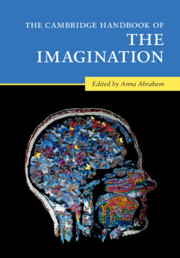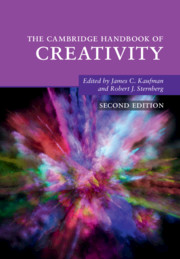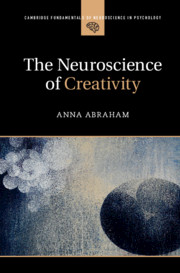The Cambridge Handbook of the Imagination
£58.99
Part of Cambridge Handbooks in Psychology
- Editor: Anna Abraham, University of Georgia
- Date Published: June 2020
- availability: Available
- format: Paperback
- isbn: 9781108453424
£
58.99
Paperback
Other available formats:
Hardback, eBook
Looking for an inspection copy?
This title is not currently available on inspection
-
The human imagination manifests in countless different forms. We imagine the possible and the impossible. How do we do this so effortlessly? Why did the capacity for imagination evolve and manifest with undeniably manifold complexity uniquely in human beings? This handbook reflects on such questions by collecting perspectives on imagination from leading experts. It showcases a rich and detailed analysis on how the imagination is understood across several disciplines of study, including anthropology, archaeology, medicine, neuroscience, psychology, philosophy, and the arts. An integrated theoretical-empirical-applied picture of the field is presented, which stands to inform researchers, students, and practitioners about the issues of relevance across the board when considering the imagination. With each chapter, the nature of human imagination is examined – what it entails, how it evolved, and why it singularly defines us as a species.
Read more- Written by experts in neuroscience, philosophy, psychology and the arts
- Supplies a comprehensive and multidisciplinary analysis of human imagination
- Presents an integrated theoretical-empirical-applied picture of the field of imagination
Reviews & endorsements
'This edited volume offers a unique combination of neuroscientific, philosophical, psychological, anthropological, and historical perspectives on imagination. All the contributors are acknowledged masters of their respective disciplines, as well as excellent writers to boot, which makes this handbook an indispensable resource for anyone interested in this fascinating subject.' Elkhonon Goldberg, Clinical Professor, New York University School of Medicine
See more reviews'This is a fantastic contribution to research on imagination. The activity of imagining is invoked across a large range of otherwise diverse human activities; it's therefore crucial that researchers from different backgrounds talk to each other about it. This book is a rich conversation from which anyone interested in the imagination will learn a lot.' Kathleen Stock, University of Sussex
'Anna Abraham's 'neurophilosophical' approach cultivates a holistic understanding of imagination across cultures and disciplines. Her five-fold framework provides a space for academic and applied approaches to meet, thereby bringing the 'force of imagination' to centre stage.' Gerald Cupchik, University of Toronto
'This handbook is an essential resource written by leading experts in their respective fields from across the world. Each chapter showcases a rich and detailed analysis about how the imagination is understood across several disciplines of study, including anthropology, archaeology, medicine, neuroscience, psychology, philosophy and the arts.' Scott Barry Kaufman, University of Pennsylvania
'No other handbook has collected contributions from philosophers, psychologists, and neuroscientists of imagination in one place. In doing so, this comprehensive work promises a perspective on the imagination that transcends disciplinary perspectives and boundaries. As such, it will surely be a resource for scholars of imagination for years to come.' Shen-yi Liao, University of Puget Sound, Washington
Customer reviews
Not yet reviewed
Be the first to review
Review was not posted due to profanity
×Product details
- Date Published: June 2020
- format: Paperback
- isbn: 9781108453424
- length: 862 pages
- dimensions: 252 x 178 x 40 mm
- weight: 1.7kg
- contains: 64 b/w illus.
- availability: Available
Table of Contents
1. Surveying the imagination landscape
Part I. Theoretical Perspectives on the Imagination:
2. The evolution of a human imagination
3. Material imagination: an anthropological perspective
4. The archaeological imagination
5. Philosophical perspectives on imagination in the Western tradition
6. Imagination in classical India: a short introduction
7. From prediction to imagination
8. Memory and imagination: perspectives on constructive episodic simulation
9. Capturing the imagination
10. A sociocultural perspective on imagination
11. Artificial intelligence and imagination
Part II. Imagery-Based Forms of Imagination:
12. The visual imagination
13. Musical imagery
14. Neurophysiological foundations and practical applications of motor imagery
15. Temporal mental imagery
16. Emotional mental imagery
17. Multisensory perception and mental imagery
18. Evocation: how mental imagery spans across the senses
Part III. Intentionality-Based Forms of Imagination:
19. Continuities and discontinuities between imagination and memory: the view from philosophy
20. Imagining and experiencing the self on cognitive maps
21. The neuroscience of imaginative thought: an integrative framework
22. Imagination and self-referential thinking
23. Imaginary friends: how imaginary minds mimic real life
24. Imagination and moral cognition
25. Moral reasoning: a network neuroscience perspective
26. The future-directed functions of the imagination: from prediction to metaforesight
Part IV. Novel Combinatorial Forms of Imagination:
27. On the interaction between episodic and semantic representations: constructing a unified account of imagination
28. How imagination supports narrative experiences for textual, audiovisual, and interactive narratives
29. Development of the fantasy-reality distinction
30. Imagining the real: Buddhist paths to wholeness in Tibet
31. Hypothetical thinking
32. The counterfactual imagination: the impact of alternatives to reality on morality
33. A look back at pioneering theories of the creative brain
Part V. Phenomenology-Based Forms of Imagination:
34. Imagination in the philosophy of art
35. Imagination in aesthetic experience
36. The arts and human symbolic cognition: art is for social communication
37. Aesthetic engagement: lessons from art history, neuroscience, and society
38. Dance and the imagination: be a butterfly!
39. Imagination, intersubjectivity and a musical therapeutic process: a personal narrative
Part VI. Altered States of Imagination:
40. Dreaming beyond imagination and perception
41. Dreaming is imagination roaming freely, based on embodied simulation, and subserved by an unconstrained default network
42. Aphantasia
43. Hypnosis and imagination
44. Hallucinations and imagination
45. The psychiatry of imagination
46. Meditation and imagination
47. Flow in performance and creative cognition: an optimal state of task-based adaptation
48. The force of the imagination.
Sorry, this resource is locked
Please register or sign in to request access. If you are having problems accessing these resources please email [email protected]
Register Sign in» Proceed
You are now leaving the Cambridge University Press website. Your eBook purchase and download will be completed by our partner www.ebooks.com. Please see the permission section of the www.ebooks.com catalogue page for details of the print & copy limits on our eBooks.
Continue ×Are you sure you want to delete your account?
This cannot be undone.
Thank you for your feedback which will help us improve our service.
If you requested a response, we will make sure to get back to you shortly.
×


